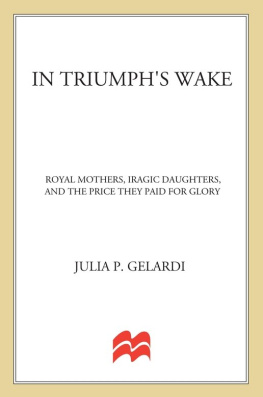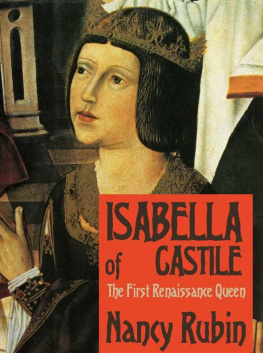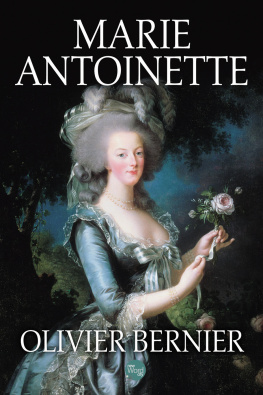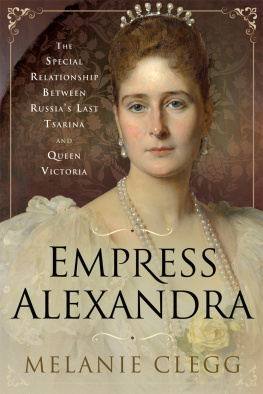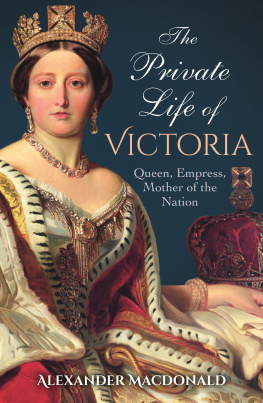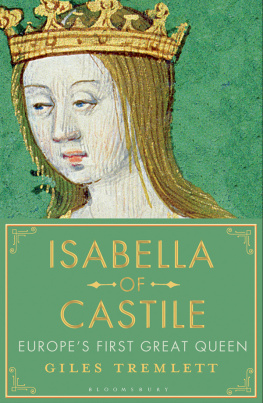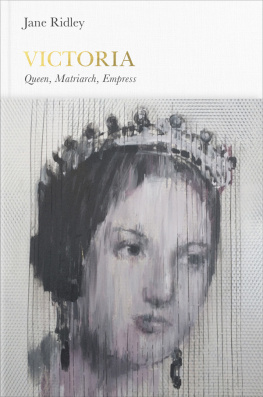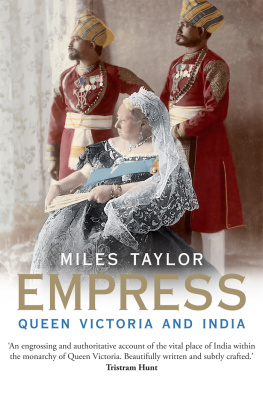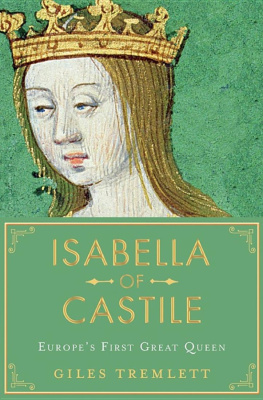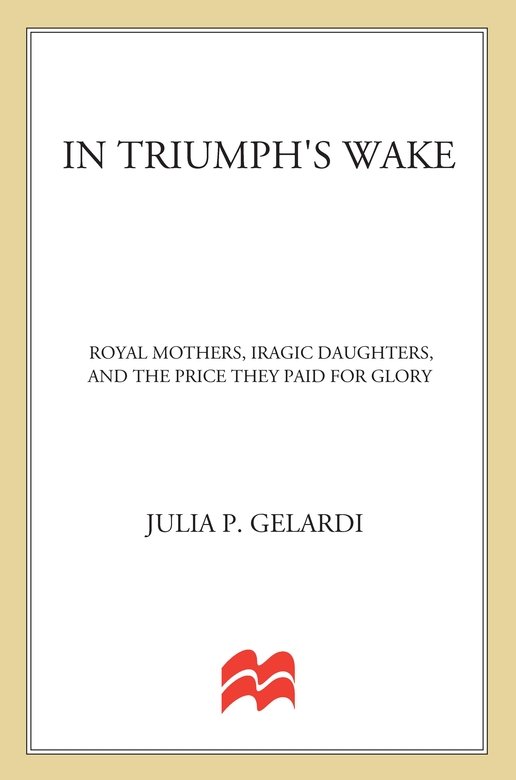A word of heartfelt thanks goes to the many individuals who have helped me with this book, beginning with the numerous historians and biographers who have written previously on the protagonists. I have based my work on their research and writing and am grateful that so many have brought to light the fascinating lives of Queen Isabella, Catherine of Aragon, Empress Maria Theresa, Queen Marie Antoinette, Queen Victoria, and the Empress Frederick.
I owe a debt of gratitude to my editor, Tershia dElgin, who helped iron out the infelicities in the text. Many thanks go out to my literary agent, Julie Castiglia, of the Castiglia Literary Agency, and to Charles Spicer, executive editor at St. Martins Press, for all their help and support for the project. Thanks as well go to Michael Homler, Allison Caplin, and the staff at St. Martins Press for their help.
I am also grateful to all my friends for their support, and my family especially, who have been patient and understanding as I delved into researching and writing on another set of royal women. Special thanks also go to my husband, who made many useful critical suggestions, gave computer expertise, and provided invaluable advice and support.
Grief and pain come alike to all; broken hearts are to be found in palaces as well as in cottages, and the bond of brotherhood seems strongest when love and pity unite all hearts, and reverence for what is good lifts up our souls.
THE EMPRESS FREDERICK, 1888
The story behind three special pairings of royal mothers and daughters has come to a close. Encompassing three distinct eras, the historical significance of the mothers remains undisputed. Distinguished by successful and celebrated reigns, Isabella of Castile, Maria Theresa of Austria, and Victoria of Great Britain remain prominent figures of great historical significance. But behind their famed roles as leaders, Isabella, Maria Theresa, and Victoria were parentsmothers of three daughters who also made their mark on history. Catherine of Aragon, Marie Antoinette of France, and the Empress Frederick of Germany, though less illustrious than their mothers, each has earned a deserved place in the annals of time.
Like their mothers, the daughters were reigning monarchs. However, whereas the mothers were queens regnant, their daughters were consorts. Both kinds of monarchs faced challenges. Whereas the queens regnant had the double challenge of securing their rights to the throne (in Isabellas and Maria Theresas cases) and ruling effectively, the consorts faced the equally difficult task of forging new dynastic alliances. These pages have explored the burdensome and demanding lot of foreign consorts. Because Catherine, Marie Antoinette, and Vicky were political pawns in great power politics, much hope and responsibility had been placed upon their shoulders, starting in their teenage years, when they became wives. The daughters were married off with the purpose of advancing their countries causes abroad. Their task entailed gaining influence in their adopted countries, first by winning over their husbands, then by winning over their courts and subjects, and finally by providing male heirs. Suspicion and jealousy were rife and hard to overcome among courts and peopleinclined to distrust foreigners, as was the case for Marie Antoinette and Vicky; Catherine overcame this disadvantage. Challenges were fewer if the consorts husbands were sympathetic to their wives; here, Marie Antoinette and Vicky were supremely blessed (Louis XVI and Frederick III were devoted husbands) but Catherine ultimately cursed.
Catherines early marital success unraveled when Henry VIII became obsessed by the need to have a male heir. Catherines misfortune stemmed from her failure to accomplish the greatest role expected of a consort: becoming the mother of a male heir. Marie Antoinette and Vicky fulfilled this role. But even here, Vicky reaped bitter seeds. Though she gave Germany a son, Kaiser Wilhelm II, not only did he cause his mother undue anguish but he also set his country on the path toward World War I. Even the long-awaited birth of a son to Marie Antoinette was politically for naught, for the Bourbon dynasty collapsed as revolution engulfed France. In the end, the daughters and their children contributed little or nothing to advancing diplomacy. Dynastic and political misfortune dogged these daughters of Isabella, Maria Theresa, and Victoria. The alliances they attempted to forge actually weakened Spanish-Anglo relations (in Catherines case), Austrian-French relations (in Marie Antoinettes), and Anglo-German relations (in Vickys).
One of Queen Victorias granddaughters, the English-born Queen Marie of Romania, once wrote of the sadness we Princesses endure in having to marry into foreign countries. The sagas of three princesses from Castile, Austria, and England attest to this sobering observation. Each of these women endured more than her fair share of sadness in her adopted country. When compared with their mothers fates, Catherines, Marie Antoinettes, and Vickys lives appear that much more poignant.
The mothers achievements as monarchs, successes realized partly thanks to supportive husbands, stand in contrast. Ferdinand provided Isabella with political and military support; Francis assisted Maria Theresa and gave moral support; Albert tutored the young Victoria in the craft of queenship and acted as her confidential secretary. Of the three husbands, only Albert remained a prince after marriage; but even though Ferdinand was King of Aragon and Francis was Holy Roman emperor, like Albert, they subordinated themselves politically to their wives, becoming the junior partners in marriage. That Isabella, Maria Theresa, and Victoria received such support from their husbands reflects positively on the womens characters and personalities. After all, the lot of husbands who must take second place behind their reigning wives has never been an easy one.
King Leopold of the Belgians, uncle to Prince Albert and Queen Victoria, correctly surmised the difficulties male consorts faced when he said: The position of a husband of a Queen, who reigns in her own right, is a position of the greatest difficulty for any person and at any time . But, he concluded, the success we all desire will depend on the good sense and right feeling not of one alone, but of both parties. It is my most intimate conviction that a really sensible husband may be the most useful, the safest and the best friend a Sovereign Queen can have. Yet, added Leopold, to enable any man to become this, it seems however necessary that the Queen herself do take from the very beginning a correct view of her married position. She ought to see clearly that from the moment of her marriage even her political success will greatly depend upon her domestic happiness, and that by endeavouring to ensure the latter she increases herself by her own power and arguments the chances of a prosperous and honourable reign. She ought then to be imbued with a strong and deep conviction that it is as well her own as the Princes interest to make common cause and to live well together. This was precisely what Isabella, Maria Theresa, and Victoria didthey found with their respective husbands common causes to espouse, and in spite of imperfections in their marital relationships, their marriages and political partnerships proved solid, enduring, and invaluable.
In the end, what is most fascinating and moving from the storied past of these unique sets of royal mothers and daughters is that the three daughters, though left in their mothers triumphant wake, faced their tragic fates with heroism. Catherine, Marie Antoinette, and Vicky each demonstrated courage and dignity. They stood up with principled ideals that their mothers had inculcated in them. If the daughters did not emerge politically victorious, as their mothers had done, they did meet their challenges head-on, unflinching in the face of the hostilities hurled at them; unbowed by the guillotines blade or the ravages of their final illnesses.

